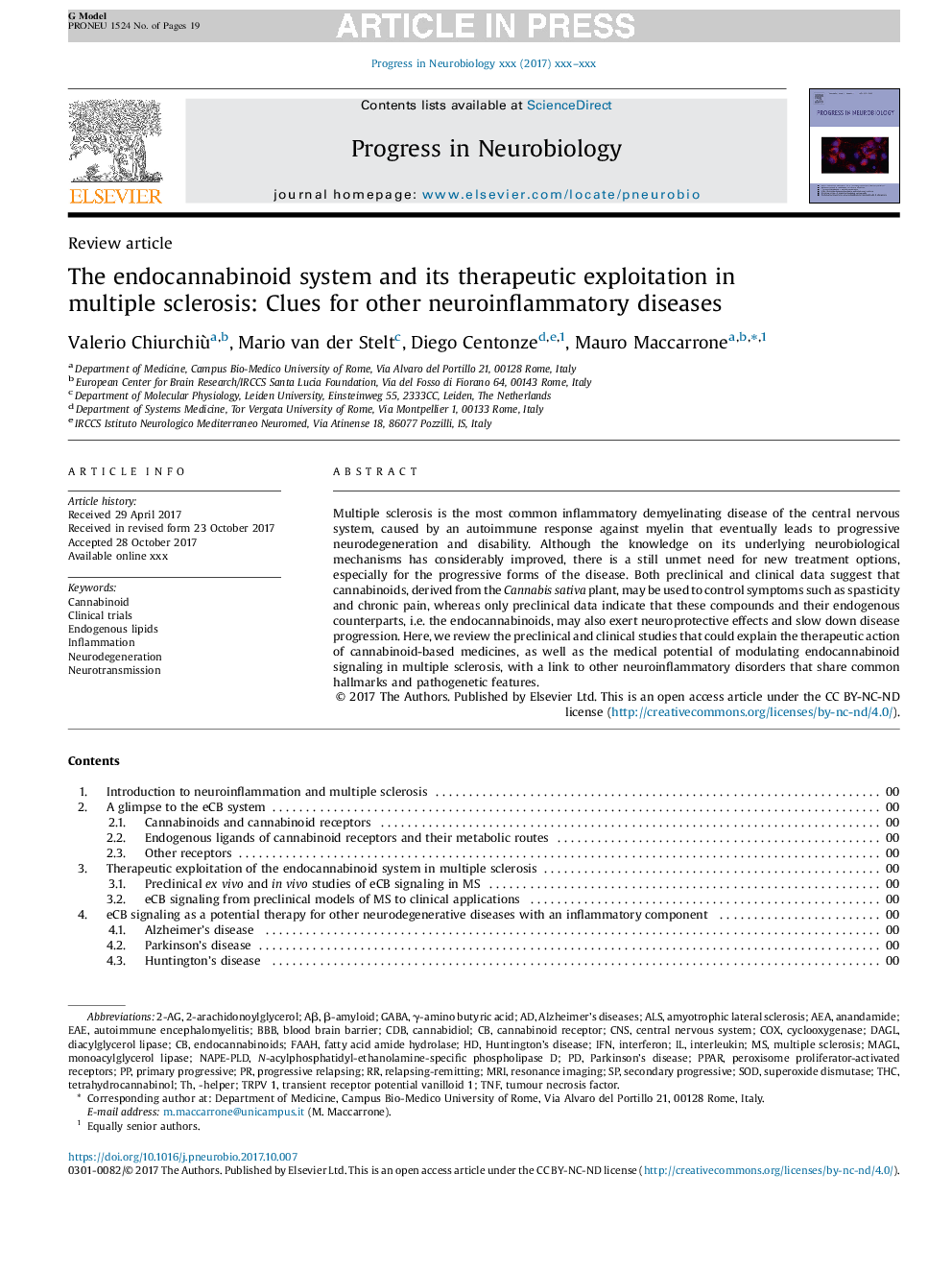| کد مقاله | کد نشریه | سال انتشار | مقاله انگلیسی | نسخه تمام متن |
|---|---|---|---|---|
| 8842199 | 1615355 | 2018 | 19 صفحه PDF | دانلود رایگان |
عنوان انگلیسی مقاله ISI
The endocannabinoid system and its therapeutic exploitation in multiple sclerosis: Clues for other neuroinflammatory diseases
ترجمه فارسی عنوان
سیستم اندوسکانبینیدها و استعمال درمان آن در مولتیپل اسکلروزیس: علائم دیگر بیماریهای عصبی و التهابی
دانلود مقاله + سفارش ترجمه
دانلود مقاله ISI انگلیسی
رایگان برای ایرانیان
کلمات کلیدی
maglTNFCDBNAPE-PLDtetrahydrocannabinolFAAH2-arachidonoylglycerolEAE2-AGPPARAβAEATHCCOXDAGL - NEC روزانهβ-Amyloid - β-آمیلوئیدγ-amino butyric acid - γ-آمینو اسید بوتیریکClinical trials - آزمایشات بالینیanandamide - آناندامیدcyclooxygenase - آنزیم سیکلواکسیژنازautoimmune encephalomyelitis - آنسفالومیلیت autoimmuneamyotrophic lateral sclerosis - اسکلروز جانبی آمیوتروفیکFatty acid amide hydrolase - اسید آمینه هیدرولاز اسید چربinflammation - التهاب( توروم) MRI - امآرآی یا تصویرسازی تشدید مغناطیسیNeurotransmission - انتقال عصبیendocannabinoids - اندوکانبایوئید هاinterferon - اینترفرونIFN - اینترفرون هاinterleukin - اینترلوکینALS - بیماری اسکلروز جانبی آمیوتروفیکHuntington’s disease - بیماری هانتینگتونAlzheimer’s diseases - بیماری های آلزایمرParkinson’s disease - بیماری پارکینسونrelapsing-remitting - تجدید حیاتResonance imaging - تصویربرداری رزونانسNeurodegeneration - تولید نوروژنیکCNS - دستگاه عصبی مرکزیSOD - سدBBB - سد خونی مغزیblood brain barrier - سد خونی مغزیSuperoxide dismutase - سوکسوکس دیسموتازcentral nervous system - سیستم عصبی مرکزیtumour necrosis factor - عامل نکروز تومورmonoacylglycerol lipase - لیپاز monoacylglycerol لیپازdiacylglycerol lipase - لیپاز دی سیل گلیسرولMultiple sclerosis - مولتیپل اسکلروزیس(ام اس)Transient receptor potential vanilloid 1 - پتانسیل گیرنده گذرا وانیلیوئید 1primary progressive - پیشرفته اولیهsecondary progressive - پیشرفته ثانویهCannabidiol - کانابیدیولCannabinoid - کانابینوئیدGABA - گاباPeroxisome proliferator-activated receptors - گیرنده فعال فعال پروکسیومcannabinoid receptor - گیرنده های کانابینوئید
ترجمه چکیده
مولتیپل اسکلروزیس شایعترین بیماری التهابی کمپلکس سیستم عصبی مرکزی است که ناشی از واکنش خودایمنی در برابر میلین است که سرانجام منجر به پیشرفت عصب و ناتوانی میشود. گرچه دانش موجود در زمینه مکانیسم های نوروبیولوژیک پایه آن به طور قابل توجهی بهبود یافته است، اما هنوز نیاز به گزینه های درمان جدید، مخصوصا برای شکل های پیشرفته بیماری وجود دارد. داده های پیشین و بالینی نشان می دهد که کانابینوئید های حاصل از گیاه کانوی سیتوا ممکن است برای کنترل علائم مانند اسپاستیکال و درد مزمن استفاده شود، در حالیکه تنها اطلاعات پیشین نشان می دهد که این ترکیبات و همتایان داخلی آنها، یعنی اندوکانانبینیدها، ممکن است عصبی محافظتی نیز داشته باشند اثرات و کاهش سرعت پیشرفت بیماری. در اینجا، ما بررسی مطالعات پیشین و بالینی که می تواند اثرات درمانی داروهای مبتلا به کانابینوئید را توضیح دهد، و همچنین پتانسیل پزشکی مدولاسیون سیگنالینگ اندوکانبینیدها در مولتیپل اسکلروزیس، با پیوند با سایر اختلالات عصبی - عصبی که دارای نشانه های مشترک و ویژگی های پاتوژنیک هستند، بررسی می شود.
موضوعات مرتبط
علوم زیستی و بیوفناوری
علم عصب شناسی
علوم اعصاب (عمومی)
چکیده انگلیسی
Multiple sclerosis is the most common inflammatory demyelinating disease of the central nervous system, caused by an autoimmune response against myelin that eventually leads to progressive neurodegeneration and disability. Although the knowledge on its underlying neurobiological mechanisms has considerably improved, there is a still unmet need for new treatment options, especially for the progressive forms of the disease. Both preclinical and clinical data suggest that cannabinoids, derived from the Cannabis sativa plant, may be used to control symptoms such as spasticity and chronic pain, whereas only preclinical data indicate that these compounds and their endogenous counterparts, i.e. the endocannabinoids, may also exert neuroprotective effects and slow down disease progression. Here, we review the preclinical and clinical studies that could explain the therapeutic action of cannabinoid-based medicines, as well as the medical potential of modulating endocannabinoid signaling in multiple sclerosis, with a link to other neuroinflammatory disorders that share common hallmarks and pathogenetic features.
ناشر
Database: Elsevier - ScienceDirect (ساینس دایرکت)
Journal: Progress in Neurobiology - Volume 160, January 2018, Pages 82-100
Journal: Progress in Neurobiology - Volume 160, January 2018, Pages 82-100
نویسندگان
Valerio Chiurchiù, Mario van der Stelt, Diego Centonze, Mauro Maccarrone,
